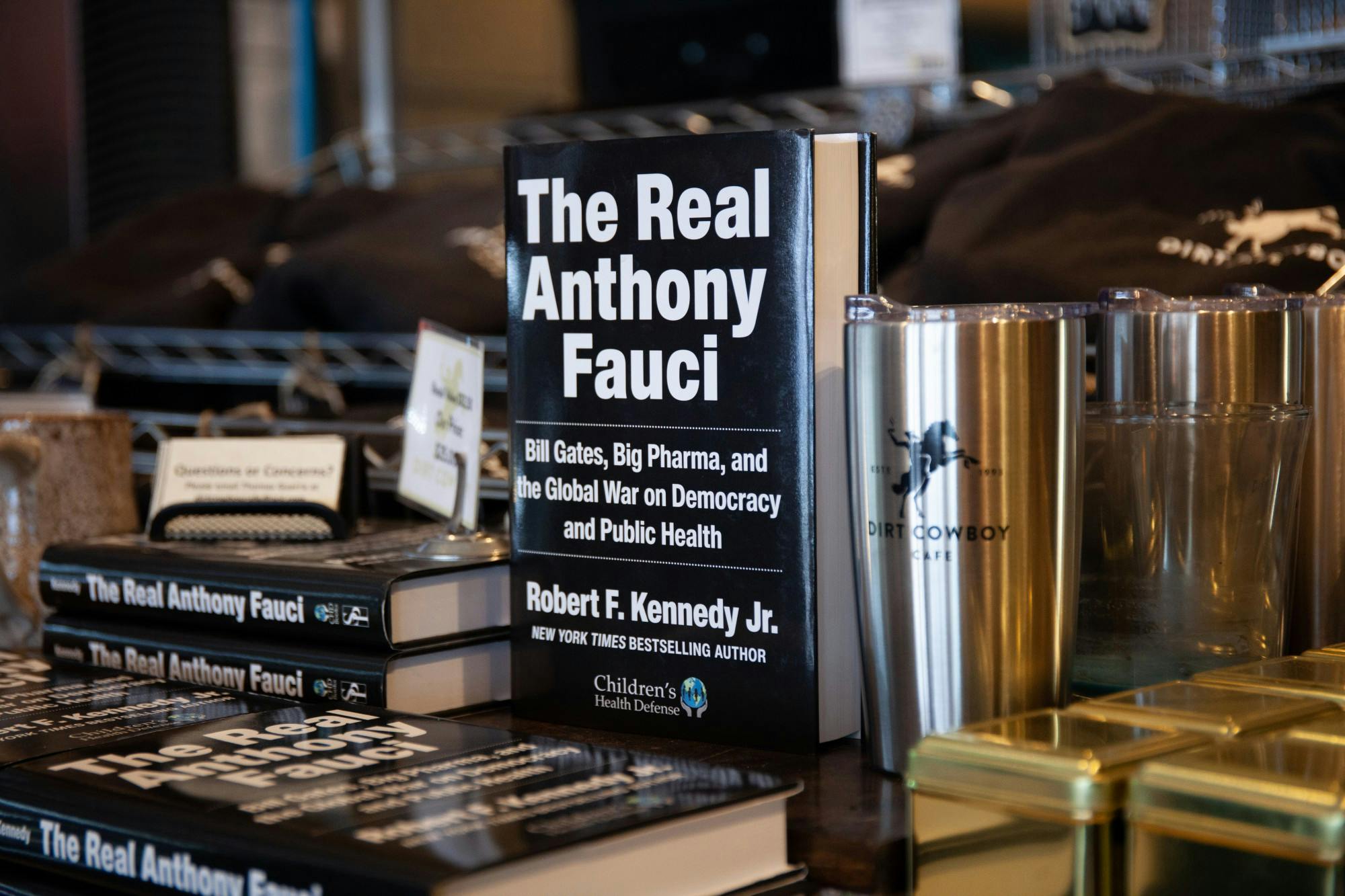Since its opening in 1993, Dirt Cowboy Cafe has been a mainstay of the Upper Valley’s coffee market, fostering fierce customer loyalty among current students, faculty and alumni for its coffee and pastries. Roughly three weeks ago, however, Dirt Cowboy entered the bookselling trade, offering copies of anti-vaccine conspiracy theorist Robert F. Kennedy, Jr.’s book “The Real Anthony Fauci.”
Dirt Cowboy owner Thomas Guerra said he first decided to sell the book after reading it for himself and researching its content. He explained that he felt motivated to share it because he “finds [himself] in a community that seems [to him]… to be uninformed about what’s going on — what’s behind the scenes here.”
According to the Children’s Health Defense Fund — an organization founded by Kennedy — the book reveals facts about National Institute of Allergy and Infectious Diseases director Anthony Fauci’s career that should “alarm” all Americans. Among the book’s many claims is that Fauci “orchestrated fraudulent studies” and gained control over global health policy in cooperation with Bill Gates and the pharmaceutical industry, according to a Barnes and Noble book overview.
Although Dirt Cowboy purchases copies of the book for $22 and sells them for $25, Guerra emphasized that the book sales are “not a profitable venture.”
“I’ve taken hits here,” he said. “I’ve lost customers over [selling] this already. I’m taking the losses to do what I think is the right thing to do.”
Jessie Wang ’23 said she first heard about the book through photos posted on the anonymous platform Librex, and she has since read about its content on Goodreads. She explained that while Kennedy may have credibility in some social circles, she believes most people would view his work as disreputable.
“If [Kennedy’s] Wikipedia bio goes out of its way to label him as a ‘conspiracy theorist,’ then you’re not that reputable, at least in the public eye,” Wang said.
One patron from the Upper Valley, who requested anonymity in order to speak candidly, said he was surprised to see Dirt Cowboy selling the book.
“It is somewhat disappointing, as a consumer, because I want to see the places that I spend my money be places that share my same morals and values,” he said. “I think [the book] is promoting misinformation and conspiracy theories about the vaccine and Anthony Fauci, who has been a public servant his entire career.”
Although he has not read the book, the patron said he first heard of it through an Upper Valley News Facebook group. He added that despite their personal opinions on the book, he will still visit Dirt Cowboy.
“It’s still really good coffee,” he said.
Wang said that she doubts patrons will redirect their business to coffee shops located farther away.
“No one is going to stop going to a coffee place that’s conveniently located at the corner of [West] Wheelock and Main [Streets] — it’s just too convenient to pass up,” she said.
Guerra said he originally anticipated a reaction from patrons but has been “pleasantly surprised.” He said that he has seen some customers come in and flip through the book while they wait for their coffee order.
“Reactions [to the book] have been across the board,” he said. “I had one customer push the food back at me and say, ‘I’m never coming back here again,’ and I’ve had other customers come in and say, ‘Thank you for fighting the fight.’”
One member of the Class of 2025, who also requested anonymity in order to speak candidly, said he purchased the book as a “joke.” He added that he will consider it a “funny memento” of his Dartmouth experience.
A large part of the book is dedicated to uncovering government corruption in the pharmaceutical industry. Guerra noted the concept of “agency capture” between the pharmaceutical industry and government regulatory agencies — including the Centers for Disease Control and Prevention, the National Institutes of Health and the Food and Drug Administration — which occurs when government officials protect the interests of the companies they are supposed to be regulating, according to Law Insider’s website.
Guerra also expressed hesitation about the FDA’s expedited COVID-19 vaccine approval and distribution process, adding that he believes the long-term side effects of the vaccine are unknown, making those who are vaccinated “guinea pigs.”
Vaccines often take upwards of 10 years to develop, but the COVID-19 vaccine became available less than a year after the virus was discovered in December 2019. According to the CDC, the process was expedited by conducting the clinical trial phases simultaneously and by initially approving the vaccines under emergency use authorizations. . The clinical trials also “involved tens of thousands of volunteers of different ages, races, and ethnicities,” and showed that vaccines are effective and had “no serious safety concerns within eight weeks following vaccination.”
Despite his misgivings, Guerra said he is not against the vaccines, adding that he encouraged both of his parents to get a booster shot and has received the vaccine himself. In Dirt Cowboy, Guerra has put up a sign disclosing that masks are available upon request and requiring that customers practice social distancing.
Guerra said that copies of the book have been selling well enough that he plans on restocking.
“I will continue to sell this book until either Anthony Fauci wins like he did with AIDS — where everything got covered up, all of his negligence, all of his incompetence got covered up. Either he wins or they start investigations,” Guerra said.
Correction appended (Feb. 23, 2022, 10:55 p.m.): A previous version of this article referred incorrectly to two government agencies. They are the National Institutes of Health and the Food and Drug Administration, not the National Health Institute and the Food and Drug Association.

Arizbeth Rojas ’25 is a managing editor of the 181st directorate from Dallas, TX. When she’s not listening to DJ Sabrina the Teenage DJ or planning her next half marathon, you can find her munching on a lox bagel.




